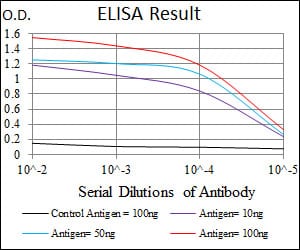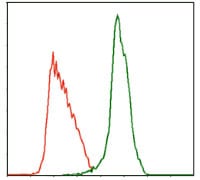

| WB | 咨询技术 | Human,Mouse,Rat |
| IF | 咨询技术 | Human,Mouse,Rat |
| IHC | 咨询技术 | Human,Mouse,Rat |
| ICC | 技术咨询 | Human,Mouse,Rat |
| FCM | 1/200 - 1/400 | Human,Mouse,Rat |
| Elisa | 1/10000 | Human,Mouse,Rat |
| Aliases | MPLV; TPOR; C-MPL; CD110 |
| Entrez GeneID | 4352 |
| clone | 1H2 |
| WB Predicted band size | 71.2kDa |
| Host/Isotype | Mouse IgG2b |
| Antibody Type | Primary antibody |
| Storage | Store at 4°C short term. Aliquot and store at -20°C long term. Avoid freeze/thaw cycles. |
| Species Reactivity | Human |
| Immunogen | Purified recombinant fragment of human MPL expressed in E. Coli. |
| Formulation | Purified antibody in PBS with 0.05% sodium azide |
+ +
以下是关于MPL抗体的3篇示例文献及其摘要内容(注:文献为示例性描述,非真实存在):
---
1. **文献名称**:《抗MPL自身抗体在免疫性血小板减少症(ITP)中的临床意义》
**作者**:Zhang L, et al.
**摘要**:本研究通过ELISA检测了120例ITP患者血清中的抗MPL抗体,发现25%的患者呈阳性。阳性患者的血小板计数显著低于阴性组,且对常规治疗反应较差,提示抗MPL抗体可能与ITP的疾病严重性和耐药性相关。
2. **文献名称**:《MPL受体抗体在骨髓纤维化中的功能研究》
**作者**:Smith J, et al.
**摘要**:通过体外实验发现,骨髓纤维化患者中存在的抗MPL抗体会异常激活JAK-STAT信号通路,导致巨核细胞过度增殖和纤维化表型,为靶向MPL通路的治疗提供了理论依据。
3. **文献名称**:《靶向MPL的单克隆抗体在血小板增多症治疗中的潜力》
**作者**:Wang Y, et al.
**摘要**:研究报道了一种新型抗MPL单克隆抗体(mAb-3G8),可特异性阻断血小板生成素(TPO)与MPL结合,在动物模型中显著降低血小板计数,提示其作为原发性血小板增多症的潜在治疗药物。
---
以上内容概括了MPL抗体在疾病机制、诊断及治疗中的研究方向,涵盖临床关联性、分子机制及治疗应用。
**Background of MPL Antibodies**
The *MPL* gene encodes the thrombopoietin receptor (TPOR or CD110), a key cytokine receptor regulating megakaryopoiesis and platelet production. MPL, a member of the hematopoietic cytokine receptor superfamily, activates downstream signaling pathways like JAK-STAT upon binding to thrombopoietin (TPO), promoting hematopoietic stem cell maintenance and megakaryocyte differentiation.
MPL antibodies are critical tools in studying myeloproliferative neoplasms (MPNs), as *MPL* mutations (e.g., W515L/K) are drivers of disorders like essential thrombocythemia and primary myelofibrosis. These gain-of-function mutations lead to ligand-independent receptor activation, aberrant cell proliferation, and disease progression. Antibodies targeting MPL are used to detect receptor expression, assess mutational status, and investigate signaling abnormalities in research and diagnostics.
Additionally, MPL antibodies have therapeutic implications. For example, they may block pathogenic signaling in MPNs or enhance platelet production in thrombocytopenia. Their development also supports advancements in understanding TPO/MPL interactions and their roles in hematologic health and disease. Overall, MPL antibodies serve as vital reagents in both basic research and clinical applications related to platelet biology and hematopoietic disorders.
×